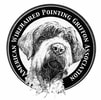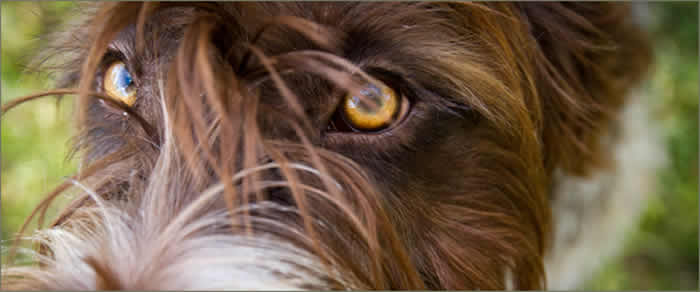Health & Genetics of the Wirehaired Pointing Griffon
The purpose of The American Wirehaired Pointing Griffon Association (AWPGA) is to preserve and protect our breed. We do that in many ways including public, breeder and judge’s education, a breed rescue program, and sponsoring and promoting participation in conformation and hunting events. Our club is interested in preserving and protecting the whole dog.
A major part of preserving and protecting the essential qualities of our breed is encouraging our members and breeders to both understand and promote the health of our dogs. In our Code of Ethics all members and specifically breeders are expected to follow guidelines established by the AWPGA. In addition, the club has adopted a Breeders Best Practices outlining health and genetic testing, and best practices in breeding and raising the Wirehaired Pointing Griffon.
Owners of Wirehaired Pointing Griffons are very fortunate because our breed is generally a healthy breed and does not seem to have some of the devastating diseases that plague many purebred dogs. However, this means that the AWPGA must be proactive in all health and genetic issues. Testing for hip dysplasia, elbow dysplasia, eye problems like entropian, and hypothyroidism are some of the types of health tests that WPG breeders and owners can do to learn about their dog’s health. When making breeding decisions, it is important to know about the sire and dam’s health, their parents and littermates,
and to test the puppies produced.
The AWPGA encourages its members and breeders to use the available health and genetic tests that are applicable to the Wirehaired Pointing Griffon. For a list of AWPGA-recommended tests, click here .
The Orthopedic Foundation for Animals "OFA" www.ofa.org maintains an open registry with evaluations of hips, elbows, eyes, thyroid, cardio and other canine health issues. PennHIP (www.pennhip.org) is another registry that also evaluates dog’s hips. However, PennHIP is a closed database and currently has many cross-bred WGPs in their database. This makes their distraction index
and percentages unreliable for our purebred Griffons.
Our breed has a coat color anomaly, tan points, that is not accepted in our breed. There is a genetic test through Vet Gen www.VetGen.com for this color anomaly and dogs can have clear, carrier, or affected status. This genetic test is particularly important for dogs used for breeding
and puppies from parents where one parent is a carrier.
The American Kennel Club (AKC) conducts large canine research studies on diseases that affect purebred dogs. Their health program is the Canine Health Foundation (CHF). This foundation, in partnership with OFA, has a breed testing designation called CHIC. This is the Canine Health Information Center CHIC http://www.caninehealthinfo.org/ and each breed designates which health tests that should be performed for their breed. The results of these tests are maintained in a registry, and dogs that have all the required tests (The AWPGA has designated hips, elbows, thyroid (Effective August 1, 2017) and eyes receive a CHIC number. Along with the breed testing program, there is a CHIC DNA Respository. CHF is trying to gather and store breed DNA samples for canine disease research. The goal is to facilitate future research aimed at reducing the incidence of inherited diseases in dogs.
The AWPGA is participating in the AKC CHIC DNA collection process and is promoting getting Wirehaired Pointing Griffon DNA samples into the CHIC DNA repository and database. By having a large number of WPGs DNA entered into the repository and database,
research can begin immediately should a breed specific disease emerge.
The AWPGA Health and Genetics Committee tracks the health testing results reported for our breed by the major testing programs. Over time, we can see the incidence of health issues in the WPG and how much progress we are making in areas like hip dysplasia. Our committee publishes articles about canine health and genetics in our breed magazine, The Griffonnier. In each issue we address a different health topic. Readers are then directed to an online survey related to that topic. By completing this survey, the committee is collecting information on the prevalence of certain health problems in our breed, enabling us to formulate recommendations to improve WPG health. The results of each survey are reported in the following issue. The Griffonnier gives the Health and Genetics Committee a way to both inform our members about canine health issues and learn more about any breed specific health problems.
An important area of health where guidelines have changed over the past few years is vaccinations. The timing of shots, frequency, and types of vaccinations needed by puppies and adult dogs is part of a vaccine protocol researched and published by the American Animal Hospital Association (AAHA) 2011 Vaccine Guidelines. The new vaccine protocol for timing and types of vaccines can be found at
The American Animal Hospital Association (AAHA) website at: https://www.aaha.org/guidelines/canine_vaccination_guidelines.aspx
All images and content Copyright © 2023 the American Wirehaired Pointing Griffon Association, ALL rights reserved.
Copyright Policy /Acceptance & Use Policy
Copyright Policy /Acceptance & Use Policy

